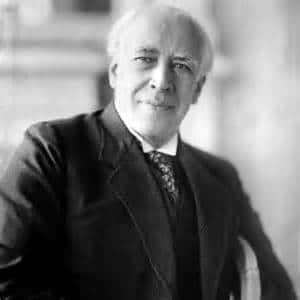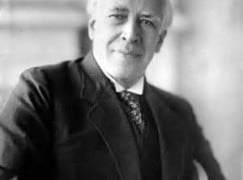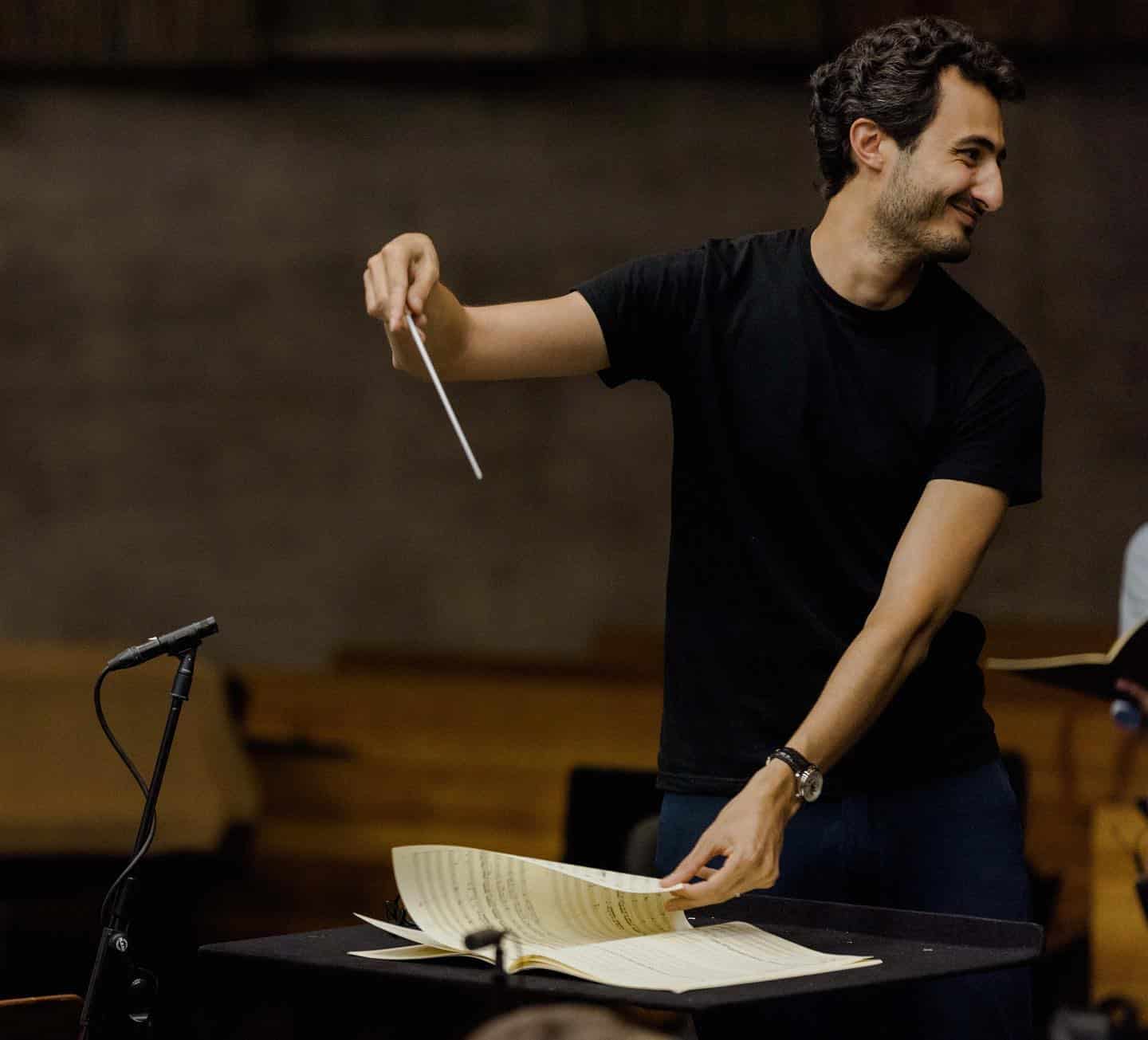Rare video: Stanislavsky shows how to direct
mainKonstantin Stanislavsky (1863-1938) was a director who decisively influenced how theatre and opera is presented. He is remembered today outside Russia as the man who said if you see a gun in the first act it will go off in the third.
And that’s about it.
Few theatre professionals would recognise his face, let alone the sound of his voice.
In this 1981 Soviet video, we see rare film of Stanislavsky discussing his method (at 2’15” to 4’32”) and rehearsing “Tartuffe”.
Enjoy.







The observation about a gun comes from Chekhov, not Stanislavsky. “Remove everything that has no relevance…If you say in the first chapter there is a rifle hanging on the wall, in the second or third chapter it absolutely must so off.” He wrote in the same vein in a letter to a colleague, and his counsel was mentioned in various reminiscences of him.
Also, Stanislavsky is remembered by far more people and for better reasons than you seem to think. Few discussions of Lee Strasberg, his ‘Method’ and the Actor’s Studio fail to mention that they had their roots in Stanislavsky’s approach, though they are not as similar as many believe. ‘Stanislavski on Opera’ (Theater Arts Books, N.Y., 1975 is the edition I own) is surely studied by directors and singers, though these days I’m not sure if by enough of them.
According the state of Regietheater, probably not.
Interesting information…. But if it was indeed Chekhov with this comment upon the rifle, he was wrong. The weapon could be a symbol of something else, for instance the violent nature of the husband. Or his inappropriate collector’s obsession which led to the divorce. And then: some authors achieve their effect by being very economical, others by being very generous with material. That has nothing to do with the quality of their writing… otherwise we should lock-up Proust and Mann in the cupboard of failures for their long-winded expositions. And the same goes for stage directors: some work with minimal means, others with a plethora of complexities. Something works or not, as distinct from style.
The remark was indeed made by Chekhov. But this isn’t the Chekhov you’re familiar with, on the USS Enterprise. This is the playwright Chekhov. One of the most successful dramatists of the early C20th, and I would take his advice over yours any day of the week.
Mr. Borstlap’s argument was essentially the same as that going through my mind when I wrote my clarification of the origin of the ‘gun principle’, as one might call it. What I’m now mulling is why Eddie Mars felt the need to make the third comment on this post almost entirely ad hominem, contributing nothing to what could be an interesting discussion (if he hasn’t already deterred others and derailed it).
When Mr Borstlap has had as many play productions as Chekhov, I may be more inclined to treat his observations with any degree of seriousness. Meantime, he remains a self-declared hater of theatre direction, howling to the moon from the sidelines.
You’re clearly unaware that Stanislavsky first developed his theories on acting precisely to help himself (and other actors) in performing the ‘realistic’ style of theatre which Chekhov was writing. It was a direct response to Chekhov’s work.
Far from your trite ad-hominem jibes about de-railing, Mr Amos, my post was sharply on topic. Unlike yours, which contributes 0.
Did you gain anything from watching the clip, and listening to Stanislavsky’s comments about ‘truth & lying’, I wonder?
This sentiment was echoed by the Russian Formalist critic Boris Tomashevsky (1890-1957), who wrote that, if a character in a play hammers a nail into the wall in Act I, then he or some other character will have to hang himself from it in Act III.
Not to be confused with Yiddish theatre actor/producer Boris Tomashevsky, Michael Tilson Thomas’s grandfather.
To avoid confusion, one must just remember that Tilson Thomas’ grandfather’s name was transliterated as ‘Tomashefsky’ — with an ‘f’ rather than ‘v’.
Mr. Mars, a comment re the possibility of your derailing the discussion is not ad hominem. Second, what have you read that makes you call Mr. Borstlap “…a self-declared hater of theatre direction…”? Certainly nothing here. His reference to Regietheater is hardly equivalent to hatred of theatre direction as a whole. What he is referring to (and I’m not sure you know that) concerns opera and has appalled many of us. Third, I know full well what Stanislavsky theorized, taught and practiced, and nothing I’ve written suggests otherwise. I have my doubts about Chekhov’s dictum as a general principle, but that is not to deny that it was extremely effective in his own writing and that Stanislavsky followed it in his teaching.
The continuous attacks made on ‘Regie-Theater’ (‘theatre directed by directors’) from Mr B are well-known to regular users of this website – and repeated here once more, lest there be any doubt.
Some consideration of this famous remark of ‘Chekhov’s revolver’ seems worthwhile – what did Chekhov mean by it?
It is, if we think more clearly, an admonition of over-enthusiastic directors and scenographers. If, as Chekhov posits, the gun is *not* used later in the play..it means that the action of the play (i.e.the playwright’s work) calls for no gun. In other words, placing a gun on the set in Act One would be a falsification of the author’s intentions…a red herring to mislead both actors and public. If the scene always has the inherent possibility of instant gun violence as a way out of what is happening, this presents a different and wrong interpretation of the play. A gun could only be there IF the action of the play specifically calls for it later.
Note that when Chekhov *does* call for a gun on stage (Uncle Vanya reappears with a gun when he goes berserk) it has not been snatched from any kind of wall-mounting in any case… it was somewhere in the adjacent rooms to which Vanya went. Moreover, he knew where it was, and found it quickly – which reveals both intent, and pre-meditation of the deed. It was certainly not a chance action based on suddenly noticing an available gun.
For the record, Konstantin Stanislavsky was largely resposible for rescuing Chekhov’s career, and calling him back to Moscow after he had thrown-over the theatre to return to the medical profession, in the far provinces of Russia. Stanislavsky effectively founded the Moscow Arts Theatre in order to stage Chekhov’s plays – risking his own money, and that of his sponsors and collaborators to do so. Stanislavsky also made a point of introducing the bachelor Chekhov to the young actress Olga Knipper – who would not only become his wife, but dedicated the rest of her life to performing the roles which Chekhov wrote for her, and which Stanislavsky directed so deftly.
The “continuous attacks on Regietheater” (Mr Borstlap’s or anyone else’s) are not attacks : they’re the defence. It’s Regietheater which is the attacking, not to say – the aggressive side, the victims being great works of art Regietheater rewrites and ridicules, while pretending to serve them and their authors.
Regietheater is, as aggressive ideologies usually are – an overwhelming lie.
Just so. And Regietheater is not “theatre directed by directors”. It translates very simply as ‘directors’ theatre’, i.e., a mode of producing operas in which the director’s notions supersede those of everyone else, including the composer, conductor, and lead singers. Out of this has come egregious egotism, bizarre stagings, and some mightily tense rehearsals that have on occasion turned into warfare. Regietheater has been a long-running controversy and Mr. Borstlap and I are but two voices in the great chorus of its critics.
My apologies – I took you for someone interested in Stanislavsky or Chekhov.
I wouldn’t have bothered you, if I’d realised you simply wanted to type an off-topic and non-specific screed about contemporary opera directors whom you allege have earned your ire…along with that of Messers Backson & Borstlap (allegedly). But please don’t name names or instances (as if you would!) – you’ve already derailed the entire topic in the interests of belittling people against whom you harbour some unspecified yet deep-seated grudge.
@Eddie Mars
The “grudge” against the Regietheater ideologists and practicioners has been “specified”, here and elsewhere, innumerable times. Unfortunately, here you are missing such a fine opportunity to defend these – allegedly? – slandered (belittled?) people. Could it be that, not trusting the strength of your arguments, you consider more careful to avoid a serious debate on the subject?
PS. Any reader of this post who listens to the video and wants to know more, cannot, I think, do better than get hold of a copy of Vasily Toporkov’s Stanislavski in Rehearsal. The work consists of the text of Tartuffe with Stanislavski’s directions and general teaching interspersed. There are parts of the work in which the Master reveals the very essence of his method with great clarity. Toporkov was a member of the Moscow Art Theatre and recorded Stanislavski’s work over a period of ten years. Available on Amazon for between $18 and $25 when I looked this p.m.
“He is remembered today outside Russia as the man who said if you see a gun in the first act it will go off in the third. And that’s about it.”
That’s about it??
In the States, at least, every serious student of stage acting or theatre history knows about Stanislavsky. Is that really not true in Britain?